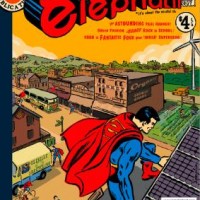From the Autumn ’05 issue
The below talk was given at elephant’s benefit for the Boulder Co-op, elephant:live.
Those of you out there who practice music know that it has many different facets. Most people regard music as a performance art, where entertainment is the focus, as opposed to a vehicle for communication, or even a ceremonial process.
I went to Naropa [University] for many years. I did the 10-year program [Laughter]. Before I graduated I was in the Psychology department and was practicing forms of meditation, martial arts and was involved in Native American spirituality; the Sun Dance and the Sweat Lodge, and so on.
I probably wouldn’t have gotten involved in music except that a friend of mine told me that Indian music actually emphasizes not just how good you are technically, but that the art form is all about relationship. I thought to myself, “What do you mean? Wow! Music is about relationship, communication?” [Laughter] And he went on to explain that in Indian music, there’s a concept called sum, which means coming together. Sum comes from a an old Sanskrit word called Sumagraha, which means coming together at home. The first beat of every rhythm cycle is called sum. And since many of these Indian rhythmic cycles can be quite long, it becomes a key element. This important concept may at first be present only symbolically to the musician, but after you play a bit and develop an emotional association that “We’re going to meet at beat one, but then journey off into the unknown world of improvisation, then meet again,” it’s a way of saying, “We’re going to play together in the relationship of music.” When I play with Rashon Bhartiya—we’ll play a little bit of music for you tonight—it’s the relationship that turns me on—the joy comes from meeting together at sum.
Now esoterically, Sumagraha also refers to the origin of all energy, and also the point to which all energy returns. It’s the source. Knowing this, and having a contemplative intention—as many of us know who have sat in the Buddhist or Hindu context—there’s a sense of being at home, being with yourself, being present—and then amidst your meditation you suddenly notice that you’ve gotten away. So it’s a journey of coming back, coming back. A good friend of mine, Sharon Salzberg, who many of you know, talks about the kindness of always understanding that coming back is an important part of this process. It’s not about always being home. It’s about traveling away and coming back, coming back.
If you looked at meditation from a musical perspective, there’s a rhythm cycle happening as you sit and watch your mind and return to what you want to pay attention to. And that’s what we’re doing when we play.
When I sit with my instrument, it’s about that process of returning again and again into myself, feeling at home—and hopefully meeting the other musician who also pays attention to that.
I had my music practice and I had my meditation practice, and they really can become one way of paying attention. I’m not living two or three lives anymore. When I’m washing the dishes, the same analogies apply. When I’m playing music, it applies. When I’m sitting in meditation, it applies. So that’s been my path.
Musicians aren’t always the most stable people. [Laughter] So it helps in a lot of ways. Music has been a lens, that started off fairly foggy, that I’ve had to polish. And that’s the practice: polishing, polishing, polishing, polishing. Or, as with sand that turns into glass—a lot of heat is required. Practice. And so, learning the tabla, which is probably the most difficult drum on the planet… (which I didn’t know in the beginning, I just thought it was pretty) [Laughter] The tabla has required a lot of heat, a lot of focus, a lot of returning, returning, returning to refine it to where I can actually enjoy the instrument and the music. It is refreshing to be more in the moment with where I actually am in my musical process as opposed to trying to be and do what the big boys do. I’m actually enjoying myself now more and more, which is a nice way to live.
Ty Burhoe is the best: tyburhoe.com
Our very first videoed elevision—we’d done ’em live and unvideoed before that, recorded ’em and put ’em in elephant. Now called Walk the Talk Show:






Read 2 comments and reply